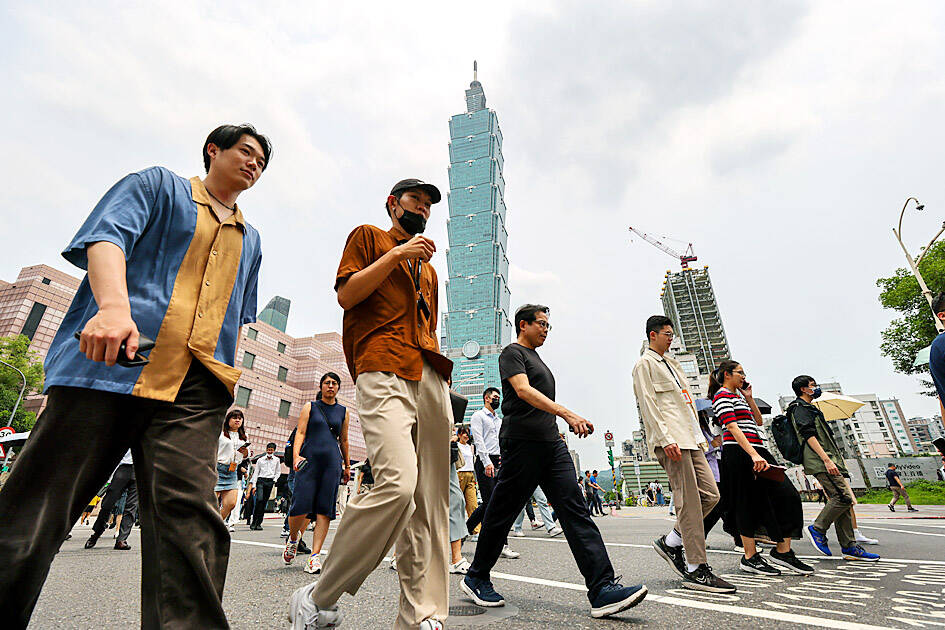Moody’s Ratings and S&P Global Ratings have reaffirmed Taiwan’s sovereign credit ratings at “As3” and “AA+” respectively with a stable outlook on the back of high income and wealth levels, a strong institutional framework and robust external positions.
The affirmations came as Taiwan’s economy is gaining momentum after quarters of slowdown induced by stubborn global inflation and monetary tightening.
Taiwan’s strong fiscal and external buffers have improved relative to peers as evidenced by recent shocks linked to the COVID-19 pandemic and the ongoing US-China technology dispute, the two ratings firms said.

Photo: Ritchie B. Tongo, EPA-EFE
“Taiwan stands as the epicenter of the global semiconductor supply chain, accounting for over 60 percent of global production and the majority of manufacturing capacity of the world’s most advanced chips,” Moody’s said on Tuesday.
Such dominance in semiconductor production and the peripheral electronics sector has supported Taiwan’s economic competitiveness and resilience, with a near monopoly on the production of advanced chips, and promised stability and growth in an otherwise highly cyclical industry, it said.
Taiwan would benefit further from long-term prospects for the chip industry and take up the lion’s share of a growing pie as emerging technologies with commercial and military applications continue to demand more powerful and faster processing and memory capabilities, it said.
In addition, Taiwan has demonstrated economic stability, fiscal health and monetary flexibility through recent shocks, the two global ratings agencies said.
Taiwan’s fiscal policy effectiveness has strengthened as exemplified by its adherence to fiscal discipline and the lowering of its debt burden, when other similarly rated peers have seen their debts rising higher than pre-pandemic levels, Moody’s said.
Although the Taiwanese market is fraught with ample liquidity, the central bank’s sound monetary management has kept inflation at stable and relatively low levels, S&P said yesterday.
Taiwan has one of the lowest interest rates worldwide even though imported inflationary pressure has built up due to rising international prices for raw materials, S&P said.
The central bank’s rate hike in March would help keep inflation at 2.16 percent this year, although a weak local currency and recent hikes in electricity tariffs lend support to inflation expectations, S&P said.
Nevertheless, Taiwan’s longstanding sovereignty dispute with China would limit the chance of upside surprises, the two agencies said.
US-China tensions have grown from trade to technological competition and geopolitical influence. Taiwan’s unique position as a dominant player in the semiconductor supply chain increases its relevance to both superpowers, Moody’s and S&P said.
Volatile cross-strait developments would pose risks that constrain Taiwan’s credit profile, but the probability of a large-scale military conflict is low, they said.

DIVIDED VIEWS: Although the Fed agreed on holding rates steady, some officials see no rate cuts for this year, while 10 policymakers foresee two or more cuts There are a lot of unknowns about the outlook for the economy and interest rates, but US Federal Reserve Chair Jerome Powell signaled at least one thing seems certain: Higher prices are coming. Fed policymakers voted unanimously to hold interest rates steady at a range of 4.25 percent to 4.50 percent for a fourth straight meeting on Wednesday, as they await clarity on whether tariffs would leave a one-time or more lasting mark on inflation. Powell said it is still unclear how much of the bill would fall on the shoulders of consumers, but he expects to learn more about tariffs

Meta Platforms Inc offered US$100 million bonuses to OpenAI employees in an unsuccessful bid to poach the ChatGPT maker’s talent and strengthen its own generative artificial intelligence (AI) teams, OpenAI CEO Sam Altman has said. Facebook’s parent company — a competitor of OpenAI — also offered “giant” annual salaries exceeding US$100 million to OpenAI staffers, Altman said in an interview on the Uncapped with Jack Altman podcast released on Tuesday. “It is crazy,” Sam Altman told his brother Jack in the interview. “I’m really happy that at least so far none of our best people have decided to take them

PLANS: MSI is also planning to upgrade its service center in the Netherlands Micro-Star International Co (MSI, 微星) yesterday said it plans to set up a server assembly line at its Poland service center this year at the earliest. The computer and peripherals manufacturer expects that the new server assembly line would shorten transportation times in shipments to European countries, a company spokesperson told the Taipei Times by telephone. MSI manufactures motherboards, graphics cards, notebook computers, servers, optical storage devices and communication devices. The company operates plants in Taiwan and China, and runs a global network of service centers. The company is also considering upgrading its service center in the Netherlands into a

NOT JUSTIFIED: The bank’s governor said there would only be a rate cut if inflation falls below 1.5% and economic conditions deteriorate, which have not been detected The central bank yesterday kept its key interest rates unchanged for a fifth consecutive quarter, aligning with market expectations, while slightly lowering its inflation outlook amid signs of cooling price pressures. The move came after the US Federal Reserve held rates steady overnight, despite pressure from US President Donald Trump to cut borrowing costs. Central bank board members unanimously voted to maintain the discount rate at 2 percent, the secured loan rate at 2.375 percent and the overnight lending rate at 4.25 percent. “We consider the policy decision appropriate, although it suggests tightening leaning after factoring in slackening inflation and stable GDP growth,”